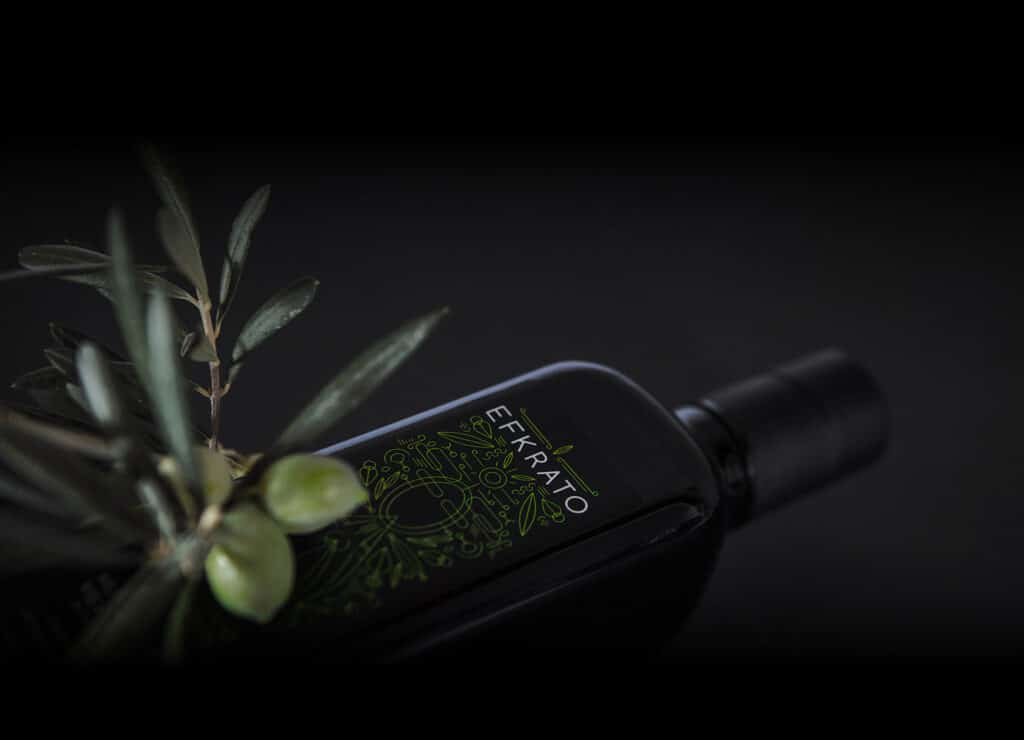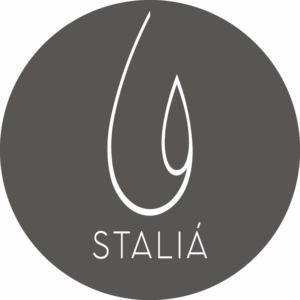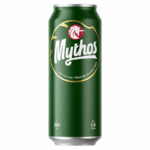Technical analysis of EFKRATO olive oil - Crete
This article details the technical analysis of Efkrato olive oil according to ten technical sections. Produced in the region of Rethymnon, in the heart of Crete, Efkrato olive oil reflects a deep-rooted agricultural tradition. It is based on the Tsounati variety, grown on the hillside in the village ofEpiskopi. This early-harvest oil combines aromatic freshness, nutritional richness and full traceability. Each vintage is born in a strictly controlled environment, respecting the rhythm of the tree and organic standards.
Efkrato stands out for its technical, cold, water-free extraction and immediate filtration. Storage under nitrogen preserves aromas and sensitive polyphenols. In this way, the producer guarantees a rare stability, documented by precise certificates. HPLC-NMR analyses from the World Olive Center for Health validate this structure. Sensory evaluation by a trained panel confirms the fine taste. In addition, a report from the University of Athens attests to its squalene content, reinforcing its biological value.
Each one includes verified results and their expert interpretation. In this way, readers gain access to a clear, rigorous, field-oriented vision. The aim is to equip competition juries, high-end importers and gourmet chefs. They will find here an olive oil with a molecular signature that surpasses standards. It combines an ecological approach, analytical accuracy and culinary potential. This profile meets the growing demand for products that are traceable, nutritious and suitable for professional or competition use.
Origin, variety & growing conditions: the essence of Tsounati from Rethymnon
An olive grove between mountain and sea, in Episkopi
The village ofEpiskopi, between Rethymnon and Georgioupolis, is home to the olive trees that produce Efkrato oil. The area benefits from a complex microclimate, combining sea breezes from the north and high-altitude currents from Psiloritis. As a result, nights remain cool even in autumn, while days offer regular sunshine. This alternation favors slow ripening, essential to the aromatic density of early-harvest oils.
The well-structured clay-limestone soil enables century-old olive trees to root deeply. This type of soil ensures a stable water supply, even without irrigation. The absence of artificial water at the end of the cycle naturally enhances the concentration of phenolic compounds. The altitude, between 150 and 300 meters, and the south-facing aspect ensure harmonious fruit development.
This combination of climatic, geological and agronomic factors results in an oil that is stable, dense and faithful to its terroir. As a result, Efkrato can boast consistent traceability, year after year, while respecting the natural balance of the site.
A historical variety: Tsounati (Mastoidis)
Efkrato olive oil comes exclusively from the Tsounati variety, also known as Mastoidis. This Cretan cultivar is one of the oldest in Europe, particularly in the western and central parts of the island. Tsounati is distinguished by its tender flesh, slow ripening and ability to produce an oil rich in secondary compounds.
Efkrato grows this variety as a single variety, on selected plots in Episkopi. This choice guarantees constant varietal identity, vintage after vintage. In this way, the sensory expression of Efkrato reflects the botanical typicity of Tsounati, without interference from other cultivars.
The resulting flavor profile combines aromatic finesse and balanced structure. The oil is fluid yet dense on the palate, with soft vegetal notes, far removed from overly bitter or pungent profiles. What’s more, Tsounati provides an ideal base for natural oxidative stability, without the need for corrective techniques.
Efkrato’s well-documented choice of varietals enables it to position itself as an authentic olive oil, faithful to its terroir and origins. In this way, it meets the expectations of specialized buyers, sommeliers and juries in search of rare but reproducible profiles.
Organic certification & regenerative farming
Efkrato is officially certified organic, in line with current European standards. The grower follows a regenerative cultivation model, based on observation, patience and biodiversity. No artificial irrigation is used, even at the end of the cycle. This voluntary constraint naturally boosts antioxidant levels in the fruit.
The soil is kept alive by a permanent vegetation cover made up of local, spontaneous plants. This vegetation protects against erosion, shelters natural auxiliaries and nourishes the trees via compost produced on site. What’s more, no chemical pesticides are used. He favors mechanical solutions, plant extracts and biological balances.
Human intervention is limited and targeted. Each tree grows at its own pace, without forcing or aggressive treatments. This choice respects the natural resilience of the orchard, and preserves the ecological balance over the long term.
Unlike intensive agriculture, Efkrato is not based on impoverishing monocultures. Each plot is home to a diversity of plants, insects and useful micro-organisms. This approach guarantees a clean, consistent oil , faithful to its soil, sought after by committed chefs, organic grocery stores and professionals concerned with environmental quality.
A production system on a human scale
The Efkrato estate adopts an artisanal model, with no heavy mechanization or standardization. Each plot is monitored manually by the grower’s team. In this way, the trees maintain their natural rhythm, without over-stimulation or intensive pruning.
Harvesting is carried out day by day, according to the real evolution of fruit ripeness. This choice ensures that only the best olives are picked, and guarantees analytical consistency between bottles. No batches are mixed. Each cuvée faithfully reflects a place, a time and a method.
Efkrato ensures total traceability, from tree to bottle. Each batch carries a specific number, associated with independent analyses (NMR, chemical, sensory). These data are available to professionals who wish to verify quality before purchase.
Lastly, distribution follows a short, transparent logic. The producer favors specialized channels: delicatessens, gourmet chefs, niche exporters. This choice guarantees perfect consistency between terroir, technical specifications and taste experience.
Harvesting, extraction & storage: vintage precision for freshness
Early, selective harvesting by hand
The Efkrato olives were harvested in October 2023, at a stage known as “green to semi-turning”. This carefully chosen moment maximizes the concentration of polyphenols and volatile aromatic compounds. As a result, the oil retains its intense vegetal profile, which is sought after in early harvests.
Harvesting is done entirely by hand, directly on the tree. No heavy machinery is involved. This method respects the structure of the fruit and avoids shocks responsible for premature oxidation. The fruit is immediately sorted in the field, then placed in perforated containers to limit humidity.
Transport to the mill takes less than two hours. The crushing site is deliberately located close to the plots. This protocol reduces the risk of fermentation, preserves the active enzymes, and guarantees a fresh, intact base for extraction.
This rigorous harvest management is essential to the final quality of the oil. It determines not only its taste, but also its analytical stability and real nutritional value.
Two-phase cold press, no water added
Efkrato is extracted using a two-phase process, without the addition of water. This choice preserves the water-soluble compounds often lost during conventional extractions. As a result, the oil retains a high concentration of sensitive polyphenols and antioxidants.
The temperature remains strictly below 25°C throughout the process. Mixing is deliberately short. It takes place in a controlled atmosphere, limiting oxidation from the very first minutes. This protocol protects primary aromas, heat-sensitive phenols and natural pigments such as chlorophyll.
The result is a fresh, dense and stable oil, in keeping with the expression of the Tsounati variety. This type of extraction makes the most of early harvests, without altering the oil’s molecular signature.
What’s more, the absence of water prevents dilution of the active molecules. This reinforces oxidative stability in the medium term. Each step is designed to maintain the juice’s purity, while respecting the constraints of the terroir and organic regulations.
Technical analysis of EFKRATO olive oil: Immediate filtration and storage under nitrogen
As soon as it leaves the decanter, Efkrato oil undergoes immediate filtration. This process eliminatesresidual moisture and pulp particles, responsible for accelerated degradation. As a result, the oil remains stable, pure and suitable for long-term storage.
Storage takes place in food-grade stainless steel tanks, with temperatures constantly regulated between 16 and 18°C. Each vat is sealed in a nitrogen atmosphere to protect oxygen-sensitive polyphenols. This method prevents premature oxidation, while keeping the aromatic structure intact.
This method of preservation extends the functional life of the oil. What’s more, it preserves the organoleptic freshness and nutritional value measured during initial analysis. In this way, each bottle retains the same intensity as on the day of pressing.
This rigor enables us to offer a technically stable oil, suitable for cellar storage or export. In fact, it meets the requirements of specialized distributors and chefs looking for an oil that is consistent over time.
Packaged in a high-end protective container
Efkrato is packaged in opaque metal bottles designed to block harmful UV rays. This type of packaging protects the oil from light, which is responsible for the degradation of polyphenols and premature oxidation. As a result, the oil retains its freshness and stability right up to the moment it is opened.
Each bottle carries a unique batch number, directly linked to a certified analysis report. This identification guarantees absolute traceability, from pressing to packaging. Customers, whether professionals or private individuals, can thus verify the exact origin of their product.
In addition, the metal acts as a thermal and oxygen barrier. It preserves the nutritional qualities of the oil, as well as its sensitive aromas. This type of container is ideal for shelf or cellar storage, or for export.
The final packaging complies with the most demanding standards in the sector. It maintains the oil in optimal storage conditions, without altering its organoleptic profile or certified chemical parameters.
Technical analysis of EFKRATO olive oil
Complete polyphenolic analysis: controlled functional density
Technical analysis of EFKRATO olive oil: Official methodology and accredited laboratory
Analysis of Efkrato’s biophenols was carried out by the World Olive Center for Health. The laboratory used the official NMR spectroscopy method, validated by the International Olive Oil Council (IOC). This technique makes it possible to quantify each molecule individually, with extreme precision.
The analysis clearly distinguishes specific compounds such asoleocanthal,oleacein, and the aglycones of oleuropein or ligstroside. These molecules play a key role in olive oil’s antioxidant and anti-inflammatory activity.
The report corresponds to sample number WOC11156, from the October 2023 harvest. This batch was bottled without blending and forms the basis of all the data published here. Thus, the results presented accurately reflect the final product offered to the consumer or professional.
This level of analysis guarantees a reliable, reproducible reading, tailored to the expectations of competition panels, nutritionists, chefs or specialist importers.
Certified results: a balanced, efficient profile
Analysis results for Efkrato lot WOC11156 confirm a functional, balanced oil. Total polyphenol content, expressed as tyrosol equivalent, reaches 398 mg/kg. This figure far exceeds the minimum threshold of 250 mg/kg required by European Regulation (EU) 432/2012.
What’s more, the sum of the two flagship molecules – oleocanthal + oleacein – reaches 160 mg/kg. These compounds are recognized for their anti-inflammatory effect, particularly in the context of a Mediterranean diet.
Efkrato is therefore eligible for the European health claim:
“Olive oil polyphenols help protect blood lipids against oxidative stress.”
This level of concentration places Efkrato among the so-called functional oils, useful for preventive nutritional purposes. It can be consumed on a daily basis, with no need to adapt taste or texture.
Indeed, despite its molecular richness, Efkrato retains an appreciated organoleptic accessibility. Its balance between intensity and sweetness makes it equally suitable for demanding chefs and health-conscious consumers.
A rare balance between phenolic power and fine taste
Efkrato’s ratio of oleocanthal to total polyphenols is around 27%. This percentage reflects the significant presence of secoiridoids, molecules known for their natural anti-inflammatory action. This profile confirms the quality of the harvest, as well as the care taken during extraction.
In this way, Efkrato develops a balanced molecular structure, with each component playing a complementary role. The oil remains functional without becoming excessive, reinforcing its nutritional value for everyday use.
Unlike some oils with a high phenol content (> 800 mg/kg), Efkrato does not cause throat burn or excessive bitterness. Finally, it offers a smooth, pleasant and structured taste experience. This intermediate positioning appeals to a varied public: health professionals, restaurateurs, or consumers concerned with prevention.
Thanks to this well-calibrated ratio, Efkrato is an ideal option for regular consumption, with no compromise between taste pleasure and functional benefits.
Technical analysis of EFKRATO olive oil: Stability and extended shelf-life
Efkrato’s polyphenolic structure gives it remarkable oxidative stability. This property is crucial in guaranteeing long shelf-life, both on the shelf and for export. The antioxidants present play a direct role in limiting rancidity, protecting flavors and preserving functional benefits.
So, when stored correctly – in an opaque bottle and at a moderate temperature – the oil’s nutritional and sensory qualities are maintained for over 12 months. This ensures a consistent experience, even long after bottling.
In fact, this stability is of particular interest to specialist importers, gourmet stores and chefs who demand reliable oil right up to the moment of serving.
Sensory signature & taste balance: the vegetal elegance of Tsounati
Technical analysis of EFKRATO olive oil: trained panel & validated IOC protocol
Efkrato oil has been assessed according to the protocol COI/T.20/Doc. No 15/Rev.10 the official standard of the International Olive Oil Council (IOC). The analysis was carried out in a blind tasting, by a trained and accredited panel. This protocol measures the intensity of fruitiness, bitterness and spiciness, while detecting any sensory defects.
Each oil is classified according to a strict grid, identical for all international competitions. The Efkrato sample revealed no detectable defects during analysis. It therefore meets all the criteria required to be recognized as a premium extra virgin olive oil.
This classification is based onsensory integrity, purity of profile and consistency between extraction and perception. It confirms that the oil has been cold-pressed under controlled conditions, without organoleptic alteration or fermentation.
A fresh, vegetal, well-balanced fruity green
Efkrato has a medium-intensity green fruitiness, rated 4.5/10 by the sensory panel. This level perfectly balances expressiveness and accessibility. The perceived aromas are typical of the Tsounati variety, known for its refined vegetal notes.
From the opening, clear herbaceous accents such as crumpled olive leaf andgreen almond are evident. These are joined by hints of raw artichoke, crisp green apple, and sometimes a delicate floral framework. Honeysuckle and chamomile are the most frequently cited.
This olfactory profile seduces with its aromatic clarity and consistency. It remains clean, precise and stable, without heaviness or fermentation. In fact, this purity testifies to careful pressing under controlled conditions.
Thanks to this balance, Efkrato appeals to both professional tasters and enlightened amateurs. Finally, it blends easily with fine dishes, without overpowering other ingredients.
Subtle bitterness, clean but not aggressive spiciness
Efkrato has a bitterness rating of 3.9/10 and a spiciness rating of 4.4/10. This duo forms a masterful taste balance, typical of well-extracted early-harvest oils.
Thebitterness appears as soon as it enters the mouth. It results from the concentration of secoiridoids, natural molecules derived from the Tsounati plant. In this way, bitterness structures the tasting experience without excess or aggressiveness.
It gradually fades, giving way to a light, gradual spiciness. The spiciness appears in the throat, without burning or overpowering sensation. This sharp but restrained spiciness indicates freshness and a high phenol content, while retaining a certain sweetness.
This harmonious profile appeals to chefs who want an expressive oil that respects other flavors. Last but not least, Efkrato can be integrated into blended, seasonal or terroir cuisine, without ever masking the main ingredients.
Technical analysis of EFKRATO olive oil: Length in the mouth & retro-olfaction
In retro-olfaction, Efkrato releases persistent aromas of raw vegetables, notably kale andartichoke. These fresh notes extend the tasting experience. The palate retains a clear vegetal structure, true to the Tsounati variety.
On the finish, a slightly mineral note emerges. It evokes the limestone nature of Episkopi’s soil, and signals the link between terroir and sensory profile.
Persistence is medium to long, without saturation. The oil leaves a fluid, structured and stable sensation, suitable for precise, uncluttered dishes.
This gustatory behavior appeals to chefs and oil sommeliers alike. In fact, it allows Efkrato to be used for subtle pairings, in comparative tasting or professional cooking.
In-depth reading: flavonoids, lignans & discrete molecular richness
Flavonoids present in low concentrations but well identified
Chromatographic analysis of Efkrato confirms the presence of flavonoids such as luteolin andapigenin. These compounds appear in moderate quantities, but sufficient to play an important functional role.
In this way, they reinforce the oil’s oxidative stability and support its vegetal flavor profile. Their action complements that of the main secoiridoids, in a synergistic dynamic. This combined molecular work helps preserve the active antioxidants over time.
Even in modest concentrations, these flavonoids contribute to Efkrato’sbitter balance and aromatic freshness. They are also involved in lipid protection, according to several scientific nutritional studies.
In the long term, their presence contributes to making Efkrato a stable, structured oil, suitable for regular functional consumption.
A phenolic spectrum consistent with the Tsounati variety
The Tsounati variety has a moderate biochemical profile, different from that of Koroneiki, which is very expressive in oleocanthal. . On the other hand, it offers natural richness in oleacein, ligstroside aglycone and aromatic precursors such ascaffeic acid.
So Efkrato doesn’t aim for record polyphenolic concentration. Instead, it favors a gentle complexity that develops on the palate with finesse. This signature is expressed by a stable aromatic length, a light floral framework, and minimal aggressiveness in the throat.
This technical approach highlights Tsounati’s unique qualities, often overlooked in classic competitions. Efkrato thus promotes another form of excellence, based on subtlety, balance and fidelity to the terroir.
Discreet stabilizing lignans
The analyses detected the presence of pinoresinol, a lignan specific to top-quality extra virgin olive oils. Although its concentration remains modest, its detection testifies to a clean pressing, carried out without thermal excess or mechanical alteration.
Pinoresinol acts as a natural stabilizer, slowing down lipid oxidation over time. Its presence enhances the oil’s aromatic and nutritional longevity. This molecule is also known for its cardiovascular protective effects, mentioned in several scientific publications.
Even at low doses, it indicates high extraction quality, in line with premium oil standards. Its trace confirms that every step in Efkrato’s production respects thebiochemical integrity of the fruit.
A clear, reliable and stable analytical profile
Efkrato’s analytical signature remains stable from one year to the next. It is based on an extensive cultivation method, combined with strict organic certification. As a result, the oil has a reproducible chemical identity, essential for professionals.
This inter-annual stability reassures specialist retailers, gourmet chefs and competition juries. . All are looking for oils distinct but consistent, both aromatically and functionally.
Efkrato meets this requirement. It offers a consistent, documented profile that can be measured over time. Finally, this level of consistency makes it a credible technical reference, suitable for rigorous professional use.
Technical analysis of EFKRATO olive oil
Certifications, recognition & technical legitimacy: Efkrato, the oil that speaks with its evidence
Technical analysis of EFKRATO olive oil: European and Swiss organic certification
Efkrato benefits from internationally recognized dual organic certification. It is certified EU Organic, according to regulation (EU) 2018/848, and also Swiss Organic, a standard reputed to be stricter on certain residue thresholds.
The oil guarantees thetotal absence of synthetic chemicals,GMOs or unauthorized treatments. These labels also certify sustainable resource management, based on reduced environmental impact and extensive farming practices.
What’s more, certification implies complete traceability, from plot to bottle. Each stage is controlled and validated by an independent third-party organization.
This double label is a major commercial asset in demanding markets such as Switzerland,Germany, Canada and Scandinavia. These territories prefer oils that are clean, traceable and comply with rigorous standards.
European health claim eligibility
Efkrato has a certified content of 398 mg/kg of polyphenols, measured by NMR spectroscopy. . This level exceeds the regulatory threshold of 250 mg/kg, set by Regulation (EU) 432/2012. The oil is eligible for official health claim:
“Olive oil polyphenols help protect blood lipids against oxidative stress.”
This label, rare in the food industry, promotes oil as a functional food. It gives Efkrato a unique positioning: both gastronomic and preventive. What’s more, this claim reassures informed consumers, nutritionists and specialized distributors.
Efkrato therefore stands out for its dual value: pleasure in the mouth and documented health benefits.
Implicit recognition in professional networks
Efkrato is not yet taking part in international competitions, but it is already gaining visibility. Committed chefs, particularly in vegetal cuisine, recommend it for its purity and aromatic clarity.
For example, it can be found in certain independent organic grocery stores, selected for their high standards of traceability. It can also be found in integrative nutrition programs, focusing on prevention and functional nutrition.
This discreet development is based on solid analytical evidence, not on promotional campaigns. Efkrato attracts a public of connoisseurs, attentive to the coherence between discourse, method and results.
It appeals to those who prefer verifiable facts to temporary medals.. This positioning has won the confidence of importers, tasting instructors and professional specifiers.
An oil without artificial marketing, but with scientific rigor: Technical analysis of EFKRATO olive oil
Efkrato favors analytical proofing marketing communications. Every piece of data published polyphenols, extraction method, precise origin, or preservation method – is based on verifiable, independent documentation.
The oil is positioned without artificial storytelling. It relies on technical transparency, appreciated in professional circles. This choice attracts the confidence of specialized buyers, rigorous distributors and expert journalists.
These players are looking for oils based on measurable facts, not vague promises. With Efkrato, they find a product that is documented, traceable and in line with its commitments.
Traceability & reproducibility: Efkrato, a verifiable, consistent oil
A batch identified, documented and associated with its analytical results
Efkrato oil bears the analytical code WOC11156, assigned by the World Olive Center for Health. . This code appears on the official polyphenol certificate, associated with the October 2023 harvest.
This number identifies the exact batch “2024 production”, as indicated in the producer’s Spider file. Thus, the sample analyzed corresponds strictly to the oil marketed. No substitution, extrapolation or estimation has been carried out.
Every bottle of Efkrato carries real traceability, directly linked to independent analysis. This rigorous approach guarantees total consistency between the technical data sheet, the bottle and the certificate. Last but not least, it enables the professional user to verify quality on the basis of evidence, and not simply on the basis of a declaration.
Technical analysis of EFKRATO olive oil: complete and accessible analytical file
The producer of Efkrato provides a complete analytical file, accessible to any professional buyer. This file includes several key documents, all verifiable:
A certificate of polyphenols by NMR spectroscopy
A chemical compliance sheet, in compliance with the IOC standard
Data on squalene, sterol and fatty acid content
Precise information on filtration, storage and bottling
Every stage of the process is rigorously documented, with no grey areas. This level of technical transparency, rare for a human-scale producer, offers distributors maximum security.
As a result, they can communicate with their own customers in full compliance with regulations. This approach inspires confidence and facilitates the integration of Efkrato into demanding networks.
Remarkable inter-annual consistency
Although production remains artisanal, Efkrato displays great analytical stability: polyphenol content remains within a range of 380 to 420 mg/kg, depending on recent vintages. Acidity remains below 0.3%, and aromatic density is stable thanks to a consistent methodology: same variety, same plot, same mill, same method.
An export-ready documentation template
Efkrato meets all the criteria required by international distributors. The producer ensures verifiable batch traceability, with organic certifications valid for theEuropean Union and Switzerland.
In addition, polyphenolic analysis is carried out by NMR spectroscopy, in accordance with International Olive Oil Council standards. All technical data sheets are available in English, making them easy to use for export.
Storage complies with the highest standards: stainless steel tanks, controlled temperature, neutral atmosphere. This rigor makes Efkrato suitable for export to premium markets such as Germany, Scandinavia and Canada.
In these areas, complete analytical documentation is not a bonus, but a commercial prerequisite. Efkrato fits perfectly into this logic, with a ready-to-use technical file.
Technical analysis of EFKRATO olive oil
Gastronomic uses & culinary pairings: Cretan subtlety and consistency in the kitchen
The perfect oil for finishing and raw seasoning
Efkrato reveals its full potential as a raw seasoning. Its delicate green fruitiness, fluid structure and vegetal length on the palate make it ideal for use as a finishing touch.
It enhances fine raw vegetables such as black radish, fennel or new carrots. It’s also a perfect accompaniment to cold soups made with cucumber, zucchini or split peas.
In Mediterranean or vegetarian cuisine, Efkrato goes wonderfully well with fresh salads, poached or soft-boiled eggs, or steamed fish. . It can also be integrated into mild dairy products, such as Greek yoghurt, ricotta or certain fresh cheeses.
Thanks to its natural balance, Efkrato enhances flavors without masking them. It remains present without dominating, making it a precious ally for chefs in search of aromatic precision.
Technical analysis of EFKRATO olive oil: Good resistance to soft cooking
Despite its aromatic finesse, Efkrato stands up well to gentle cooking up to 160°C. Its antioxidant content, notably polyphenols, gives it sufficient thermal stability.
This makes it ideal for low-calorie vegetable stir-fries, vegetable risottos, or ancient cereals such asspelt andbarley.. It can also be integrated into dishes simmered with herbs, such as lentils with bay leaves or chickpeas with thyme.
Efkrato also stands up to short egg-based cooking, such as omelettes or scrambled eggs in olive oil. Thanks to its balanced phenolic structure, it retains its essential aromas even after moderate exposure to heat.
This cooking behaviour confirms its culinary versatility. It is designed for chefs attentive to technical profiles as well as to individuals concerned with preserving nutritional qualities.
An educational oil for sommeliers and chefs
Efkrato is a natural choice for comparative tastings organized by oil sommeliers or chefs in training.. Indeed, its Its clear varietal signature and stable profile make it a reliable educational reference.
Its herbaceous fruitiness, low bitterness and discreet spiciness make it easy to recognize the Tsounati variety.. This makes Efkrato a a useful sensory benchmark for comparing other Greek or Mediterranean cultivars, such as Koroneiki orArbequina.
This clarity of taste, combined with a reproducible analytical structure, makes Efkrato a must for tasting workshops, cookery schools and sensory nutrition training courses. . It enables structure learning around a coherent, traceable and perfectly documented oil .
An oil to accompany seasonal menus
Efkrato blends perfectly with plant-based, Mediterranean and wellness cuisine. Sound Its elegant fruitiness, fluid texture and fresh scent enhance without dominating.
It’s a natural accompaniment to seasonal dishes, vegetarian creations, or dishes with simple layouts. This profile appeals to contemporary chefs, who are looking for a coherent, expressive oil that is discreet in its final balance.
Efkrato is all about simple, modern, ingredient-driven gastronomy. It adapts to minimalist menus as well as wellness menus, without betraying the taste of the dish.
Ecological commitment & biodiversity: ethical consistency from plot to bottle
A culture in harmony with the local ecosystem
Efkrato comes from a certified organic olive grove, managed without chemicals or intensive irrigation. . The ground is which preserves its microbial life and natural structure.
A permanent vegetation cover is maintained between the rows. This consists of native flora: clover, wild fennel, mallow and other local plants. In this way, the soil remains protected from erosion, while gaining in permeability and organic richness.
This spontaneous vegetation is home to numerous auxiliary insects, local bees and various wild pollinators. It helps create a functional, stable and self-sustaining ecosystem.
This agricultural model supports local biodiversity, while producing clean, traceable and sustainable olive oil. In this way, Efkrato meets the expectations of committed consumers and buyers concerned about environmental impact.
Zero synthetic inputs and zero irrigation at the end of the cycle
Firstly, no synthetic pesticides, herbicides or fungicides are used. in Efkrato orchards. On the contrary, management is based solely on targeted mechanical interventions, such as manual pruning or mowing between the rows.
Then, organic residues from production – olive paste, crushed wood and foliage – are recycled directly on site.. In this way, they nourish the soil, improve its structure, and limit nutrient losses. This regenerative approach supports the natural vegetative effort of each tree.
At the end of the cycle, the olive trees receive no supplementary irrigation. This deliberate choice induces controlled water stress, beneficial for the concentration of bioactive compounds, particularly polyphenols.
Lastly, this cultivation method respects the physiology of the tree, the sustainability of ecosystems and the expectations of high-end markets.. It embodies a form of agriculture demanding but sustainable, based on solid natural balances.
An artisanal regenerative model, reproducible on a human scale
Efkrato is based on a regenerative agricultural model, both traditional and structured. . The producer limits inputs, refuses intensive mechanization, and favorscontinuous observation of the trees.
Each intervention respects the annual climatic rhythm, without forcing. In this way, each Efkrato vintage faithfully reflects the natural vegetative cycle. The orchard’s equilibrium is not disturbed by the quest for excessive yields.
This model requires time, expertise and a constant presence in the field. However, it is sustainable in the long term, both ecologically andeconomically. It enables the producer to offer a stable, traceable, high-quality oil, while preserving the resources and fertility of the soil.
This rigorous approach appeals to high-end markets, committed grocery stores and importers in search of consistency between rhetoric and method.
Technical analysis of EFKRATO olive oil: An oil that carries the message of life
Efkrato’s commitment to the environment is more than just a marketing ploy. It verifies the absence of residues and a reproducible chemical signature in analyses.
It can also be tasted: the aromatic freshness, purity of plant aromas and consistency of taste reflect an uncompromising method. Last but not least, the transparency of the producer, who publishes every technical datum with precision.
For chefs, sommeliers, specialized importers and food journalists, Efkrato represents a clean, traceable, ethical oil that is consistent at every stage, from the tree to the bottle.
Technical analysis of EFKRATO olive oil
Export positioning & analytical proof: Efkrato, transparency as an asset
Complete, export-ready documentation
Efkrato comes with a complete, verifiable analytical file written to international standards. This file includes :
A certificate of polyphenols by NMR spectroscopy (reference WOC11156)
An IOC-compliant chemical compliance report
Certified sensory analysis validated by an accredited panel
A multilingual product sheet, including EU and Swiss Organic labels
This level of technical documentation facilitates theintegration of Efkrato in international catalogs.. Visit high-end distributors, specialized importers and organic boutiques can add it to their offer without any regulatory constraints.
Efkrato thus offers rare commercial security, based on measurable proof and professional transparency, adapted to demanding markets.
A handcrafted, precise and sincere image
Efkrato does not claim a luxury positioning. She prefers to play a a cutting-edge artisanal reference for demanding professionals.
It is aimed at chefs looking for clarity, oil sommeliers, and grocery stores specializing in organic, nutritional and terroir products. . Its strength lies in its absolute consistency between bottle, speech andindependent analysis.
This clarity inspires immediate confidence. This makes Efkrato a reliable, distinctive oil for specialist channels, with no marketing over-promise.
Technical analysis of EFKRATO olive oil: A stable, reproducible, valuable product
Efkrato stands out for its remarkable analytical consistency, vintage after vintage. Its certificates are clear, complete and directly linked to each batch produced.
Its taste remains consistent, making it a reproducible oil .. Unlike micro-cuvées, it can be integrated into a medium-term commercial logic.
This enables distributors to build up a consistent annual offer, with a stable profile and up-to-date documents. This reliability fosters end-customer loyalty, both in the store and in the restaurant.
An oil made to convince experts, naturally
Efkrato is not based on a fabricated story.. Sa Its balanced analytical structure, clear organoleptic signature and transparent growing methods speak for themselves.
His approach remains sober, rigorous and measurable, without excessive language or marketing. This is exactly what competition juries, specialist columnists and demanding platforms are looking for.
Efkrato embodies good, fair, traceable and technically credible olive oil. It deserves its place in serious selections, right up there with the big names in the sector.
Frequently asked questions
What is early harvest oil?
How to check that an oil is really extra virgin?
The “extra virgin” label means flawless, acidity ≤ 0.8%;
Packaging: dark bottle or metal can, recent harvest (less than a year).
Third-party certifications (IOOC, PDO, NAOOA) reinforce authenticity.
Green, bitter and pungent sensory profile is a sign of high polyphenolic oil.
What are the concrete health benefits of polyphenol-rich oil?
Polyphenols play a key role:
Protects blood lipids against oxidation (reduces oxidized LDL).
Anti-inflammatory, anti-thrombotic, neuroprotective (Alzheimer’s) effects.
Can help with weight management and glucose metabolism.
How to store olive oil at home?
Is it normal for my oil to become cloudy or solidify in the cold?













